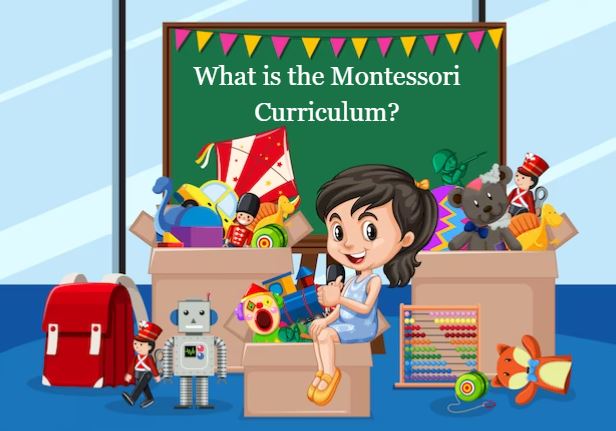What is the Montessori Curriculum?
The Montessori curriculum is an innovative and child-centered approach to early education that focuses on fostering independence, self-directed learning, and the development of essential life skills. Whether you're exploring preschools in India, search the nearest preschool to me, or considering a play school near you, understanding the Montessori curriculum can provide valuable insights into this unique educational approach.

Montessori classrooms are equipped with carefully designed materials that are self-correcting, allowing children to learn from their mistakes and discover solutions independently. These materials cover a range of subjects, including math, language, science, and practical life skills.
Here is the listing of top Preschool in Dwarka Preschool in Greater Noida
The Montessori curriculum is designed to nurture a child's natural curiosity, love for learning, and innate desire for independence. It provides a strong foundation for lifelong learning and encourages children to become confident, creative, and self-motivated individuals. If you're considering a Montessori preschool for your child, it's essential to explore schools that align with these principles and values, fostering an environment where your child can thrive.
Originally Published Here.
Key Principles of the Montessori Curriculum:
Child-Centered Learning:
In the Montessori classroom, the child is at the center of the learning process. Teachers serve as guides, observing each child's unique needs and interests, and tailoring the curriculum to support individual growth.Multi-Age Classrooms:
Montessori classrooms often consist of mixed-age groups, allowing younger children to learn from their older peers and older children to reinforce their learning by teaching younger ones. This dynamic encourages collaboration and empathy.Self-Directed Learning:
Children have the freedom to choose their activities and work at their own pace. They are encouraged to explore subjects and materials that interest them, which fosters a love for learning and independence.Purposeful Materials:
Montessori classrooms are equipped with carefully designed materials that are self-correcting, allowing children to learn from their mistakes and discover solutions independently. These materials cover a range of subjects, including math, language, science, and practical life skills.
Practical Life Skills:
A significant part of the Montessori curriculum is dedicated to teaching practical life skills, such as pouring, dressing, and cleaning. These activities promote independence and enhance fine and gross motor skills.Sensorial Learning:
The curriculum emphasizes sensory exploration and understanding. Materials are designed to engage children's senses and help them develop a strong foundation in mathematics and language.Freedom within Limits:
While children have the freedom to choose their activities, there are also guidelines and limits in place to ensure a structured and orderly learning environment. This balance helps children learn self-discipline and respect for others.Peace and Respect:
Montessori education places a strong emphasis on creating a peaceful and respectful learning community. Children are encouraged to resolve conflicts peacefully and treat one another with kindness.Assessment through Observation:
Rather than traditional tests and grades, Montessori teachers assess children's progress through careful observation of their work and behavior. This allows for a more holistic understanding of each child's development.Parent-Teacher Partnership:
Many Montessori schools maintain open communication with parents through a parent app and regular meetings. Parents are considered partners in their child's education and are encouraged to be involved in the learning process.Here is the listing of top Preschool in Dwarka Preschool in Greater Noida
The Montessori curriculum is designed to nurture a child's natural curiosity, love for learning, and innate desire for independence. It provides a strong foundation for lifelong learning and encourages children to become confident, creative, and self-motivated individuals. If you're considering a Montessori preschool for your child, it's essential to explore schools that align with these principles and values, fostering an environment where your child can thrive.
Originally Published Here.

Comments
Post a Comment